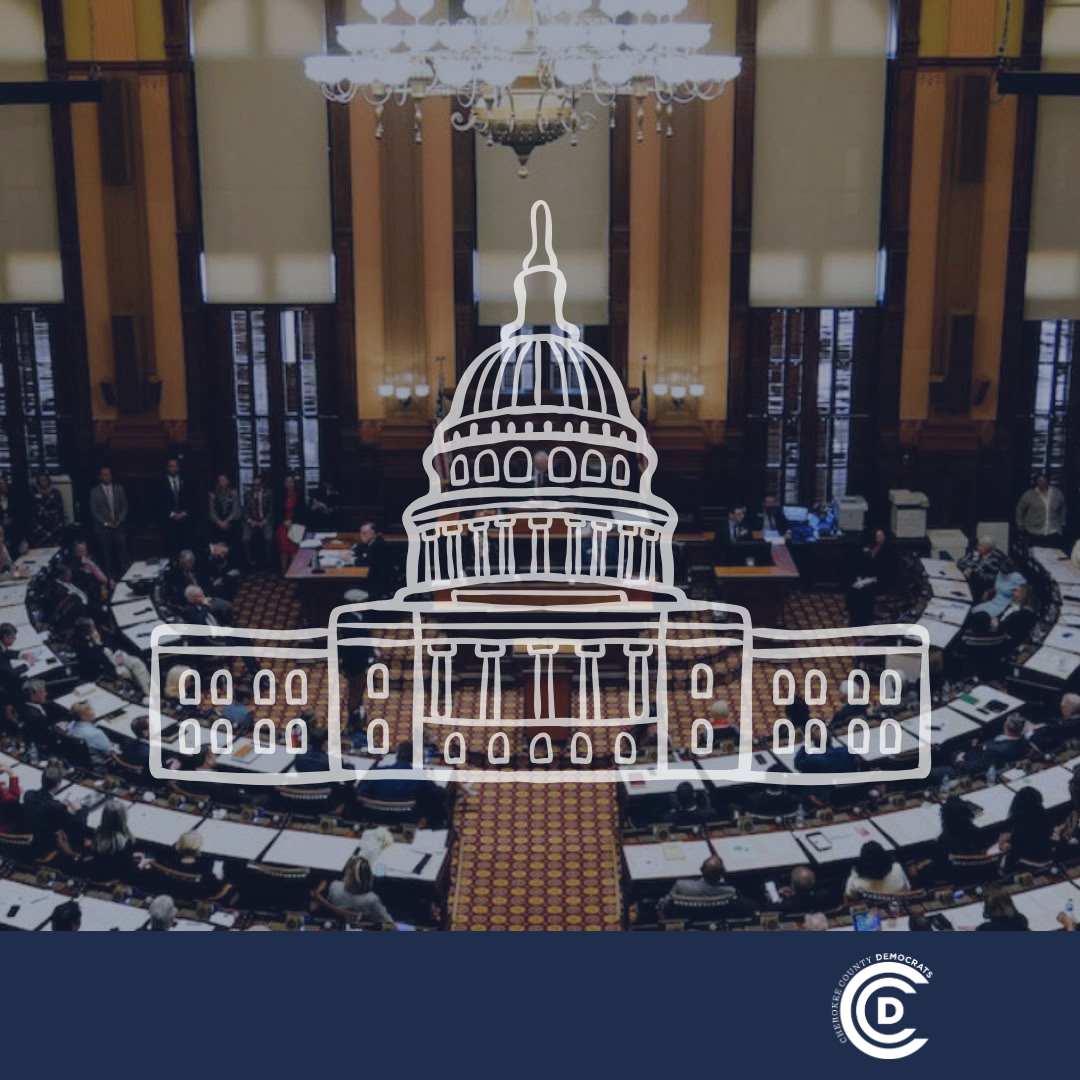On March 12, 2025, the following Georgia House of Representatives committees met to discuss bills to potentially advance:
- Insurance voted on SB 109, SB 121, and SB 276
- Agriculture and Consumer Affairs heard SB 201 and voted on SB 144
- Industry and Labor voted on SB 55 and SB 191
- Judiciary Juvenile voted on SB 98 and SB 110
- Higher Education heard SB 20, SB 85, SB 149, SB 180, and SB 193
- Public Safety and Homeland Security heard SB 21, SB 56, SB 99, and SB 147
- Governmental Affairs voted on SB 51
Select the associated links to read each bill in full.
Insurance
SB 109
This bill, discussed previously (see HERE), makes exceptions to life insurance policies regarding active duty members. Under the current law, any active duty member who dies while not in combat can have their life insurance policy denied. This bill aims to prevent insurance providers from denying claims regarding any active duty service member who dies while not in combat.
The bill passed committee.
SB 121
This bill, discussed previously (see HERE), seeks to increase the insurance limits required by Georgia law; these limits have not been increased in 14 years. Specifically, the bill aims to require individuals who are charged and convicted with DUIs to increase their limits. The current minimum covers $25,000 per person and $50,000 per accident, but medical bills and the price of cars are much higher than this now.
The bill passed committee.
SB 276
This bill relates to the Georgia Department of Community Health (DCH) Medicaid Third-Party Liability Program, specifically addressing federal requirements to ensure Georgia is in compliance with federal law. Medicaid is generally a payer of last resort and will only cover claims and items if there are no other liable third-party payers. This bill aims to put more pressure on the third-party payers to have these insurers cover their obligations in a more timely fashion.
The bill passed committee.
Agriculture and Consumer Affairs
SB 201
This bill, discussed previously (see HERE), provides protections for homeowners in counties declared state-of-emergency counties. These homeowners will be able to end contracts with contractors if the work is not done in a reasonable amount of time.
The bill will return to committee at a later date.
SB 144
This bill protects manufacturers from being held liable to warn consumers of risks above what is required by the Environmental Protection Agency.
The bill passed committee.
Industry and Labor
SB 55
The purpose of this bill, discussed previously (see HERE), is to stop certain employers from paying less than federal minimum wage to people with physical or mental disabilities. Section 14C of the Fair Labor Standard Act of 1938 allowed disabled veterans to be paid less than minimum wage through Community Rehabilitation Programs (CRP). The bill phases out the certificates that allow the CRPs to pay disabled people less than minimum wage. Starting on July 1, 2026, the pay for persons currently employed under a CRP must be raised to at least half of the federal minimum wage. On or after July 1, 2027, the pay for persons currently employed under a CRP must be no less than the federal minimum wage.
The bill passed committee.
SB 191
This bill, discussed previously (see HERE), would allow employees the option to receive their benefits and appeals determination notifications via electronic communication rather than conventional mail.
The bill passed committee.
Judiciary Juvenile
SB 98
This bill, discussed previously (see HERE), cleans up guardianship language in the Georgia code. The list of people who are appropriate to serve includes a position called “county guardian” that is intended to care for the person in need. A county guardian is not responsible for the person’s finances; instead, those finances are handled by a county conservator. The bill allows these guardians to fulfill their intended purposes and removes the burden that falls back to the state.
The bill passed committee.
SB 110
This bill, discussed previously (see HERE), seeks to make the definition of neglect more specific and allow parents to decide whether their child is sufficiently mature based on physical condition and mental abilities to avoid substantial risk. SB 110 clarifies that neglect of a child refers to denying necessary care to a child and creating an environment that is obviously injurious to his or her welfare. Current law allows authorities to label parents’ actions as neglect based on their own moral judgements without evidence of parents endangering a child’s health or safety, and this bill seeks to prohibit that.
The bill passed committee.
Higher Education
SB 20
This bill, discussed previously (see HERE), aims to alleviate the shortage of veterinarians practicing in shelter, medicine, and nonprofit pet sterilization clinics around the state and incentivizes vets specializing in this area by providing service-cancelable loans in exchange for three years at a designated practice. This bill would allow $25,000 of loans to be canceled per year for three years of service, with the intent of incentivizing veterinarians to take jobs at these lower-paying clinics rather than private practices to address the pet overpopulation and rising rates of euthanasia.
The bill will return to the committee for further discussion.
SB 85
This bill, discussed previously (see HERE), creates framework by which the General Assembly can fund scholarships for young people or young adults who have been in the Georgia foster care system as children and also supplements other available sources such as federal grants and the Hope Scholarship to ensure these individuals can cover not only tuition but also other necessary costs of education such as books, fees, housing, and meal plans. Participants must meet eligibility requirements and must attend a Georgia college or university.
The bill will return to the committee for further discussion.
SB 149
Discussed previously (see HERE), this is a workforce development bill regarding the Georgia Tuition Equalization grant program, which encourages Georgia residents to attend eligible private colleges by aiding with students’ educational costs. This bill will not remove institutional requirements to be eligible but will allow the program to serve more students. Newly qualified students at four-year institutions will be eligible for the program; these institutions must be accredited by the Southern Association of Colleges.
The bill will return to the committee for further discussion.
SB 180
This bill relates to the High Demand Apprenticeship program, which incentivizes apprenticeship sponsors to establish new or grow existing registered apprenticeship programs in Georgia. SB 180 will allow apprenticeship sponsors to enter into contracts with the State Board of the Technical College System of Georgia to potentially attract more TCSG graduates and open more paths for training.
The bill will return to the committee for further discussion.
SB 193
This bill, discussed previously (see HERE), creates a framework for a pay-for-performance for the Adult Workforce Diploma program. This program specifically targets people from the minimum age of 21 to the maximum age of 40 and gives them an opportunity to complete their high school diploma and develop critical employability and career skills through the Technical College System of Georgia. This is similar to the TCSG’s dual achievement program, but that program cuts off at the age of 21. The bill includes a sunset clause for 2031.
The bill will return to the committee for further discussion.
Public Safety and Homeland Security
SB 21
Discussed previously (see HERE), this bill states that if a local government official does not enforce Georgia immigration law, they waive their sovereign immunity and are open to civil lawsuit from anything that may occur from not following immigration law.
The bill will return to the committee for further discussion.
SB 56
Georgia has experienced several cases in which a firefighter or police officer died in the line of duty while diagnosed with COVID-19; as their deaths were ruled as a complication from COVID-19, the benefits to their families were denied. This bill, discussed previously (see HERE), states that if a public safety officer’s death was related to COVID-19 and occurred before April 15, 2022, which is when the state of emergency ended, the officer’s family would be eligible for their benefits.
The claims would need to be submitted from July 1 to August 1, 2025.
The bill will return to the committee for further discussion.
SB 99
This bill, discussed previously (see HERE), seeks to amend the Official Code of Georgia Section 16-1-3 to include the definition of a “Law enforcement officer” in relation to definitions relative to crimes and offenses. The purpose of this bill is to clarify who can assist local law enforcement or the local government in a state of emergency. This definition would provide federal officers the ability to assist in times of need.
The bill will return to the committee for further discussion.
SB 147
This bill, discussed previously (see HERE), allows the Department of Corrections to provide inmates with documents that they may need to help get a job upon release, such as a GED, driver’s licence, or state ID. These documents also include copies of the inmate’s vocational training record and resume along with records of any trade the inmate learned and their proficiency in that trade. Inmates will also be able to practice job interviews and be notified when they are eligible to apply for an occupational license from the state agency that oversees the relevant trade. Any inmate over the age of 65 or any inmate being released on medical reprieve will receive these documents at no cost.
The bill will return to the committee for further discussion.
Governmental Affairs
SB 51
This bill, discussed previously (see HERE), relates to quality-based selection of architects, engineers, and surveyors. This bill aligns with federal law to require state and local governments engaging in hiring an architect or engineer for a project over a million dollars in scale to use the quality-based selection process to hire an architect or engineer based on their qualifications and expertise. The second phase of the process is to discuss fees and negotiations to ensure they are possible; if an agreement cannot be made, the government must select the next best-qualified candidate and go through the second phase with them. This process continues until a qualified candidate with agreeable fees is procured.
This has been federal law for federal projects since the 1930s.
The bill passed committee.



